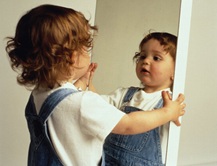Courtesy of www.replicatedtypo.com
BLOG OVERVIEW
I work on eCourse development and moderate virtual learning events in my day job so much of the learning in this course is more of a confirmation of what I already experience every day. I find the program has helped my vocabulary about Web 2.0 tools to become more precise and exact.
MY LEARNING THROUGH THIS BLOG
As I reflect back on the blog assignment, I took a close look at the posts I created. All blog posts were from module 1 and 3 readings. As I was writing them, I was so embroiled with Module 2 conference discussions I think I had a hard time separating out “content” for a blog post.
The majority of the posts were in the category that I call musings while the Society, Conflict and Learning and From Wisconsin to the World: Thank You Charles Wedemeyer! posts were in the book report category. Using the practical inquiry model described in Garrison, Anderson, and Archer (2000), the musings posts were opportunities to explore more about the topic while the book report variety did provide resolution on the topic. I found the book reports gave me the freedom to delve more deeply into the work of the authors who were referenced in the course readings that I would not have done otherwise.
I feel that I got off to a slow start but once I determined a schedule, I was able to generally meet the timelines of posting on Wednesdays and Sundays.
Now that I have reached the end of the Blog activity, I will miss it! I have three other blog posts I was contemplating but did not pursue because I ran out of time 🙁
LEARNING OBJECTIVES MODULES 1 – 3
In this section, I briefly explore my understanding of how select learning objectives for modules 1-3 where achieved in course assignments (conferences are the only assignments not included) or in the Google doc I created to summarize my understanding of how web 2.0 tools can be used in DE (https://docs.google.com/document/d/1aWVKBXbiG2V6RXzAlOCPj8ij9XWI5Dmhd7M6ALvGPXY):
| Module | Objective | Related Artifact |
| 1 | Describe the history of media and technology in distance education | Will the OU Generation Date Moore & Kearsley’s 5 Generations? Blog |
| 1 | Demonstrate knowledge of the range of terminology and values applied to technology in distance education | The blog assignment |
| 2 | Evaluate selected asynchronous and synchronous applications | Essay 1, Digital Footprints post, and One more Barrier to Mobile Learning post |
| 3 | Specify the main characteristics of Web 2.0 technologies | How Web 2.0 Tools can be used in DE Google Doc |
| 3 | Estimate the educational possibilities of Web 2.0 application | How Web 2.0 Tools can be used in DE Google Doc |
| 3 | Experience hands-on Web 2.0 technologies | The blog assignment and the wiki exercise |
REFERENCES
Garrison, D. R., Anderson, T., & Archer, W. (2000). Critical inquiry in a text-based environment: Computer conferencing in higher education. The Internet and Higher Education,2 pp. 87-105. doi:10.1016/S1096-7516(00)00016-6

Joanne,
This is an excellent blog throughout, and I hope you’ll find it useful beyond the requirement for a class activity. You hit the nail on the head regarding a schedule – as you wrote, once you gave yourself an “assigned” time for posting you were fine. This sort of thinking applies to most aspects of learning at a distance, in my opinion (and in my experience).
Cindy